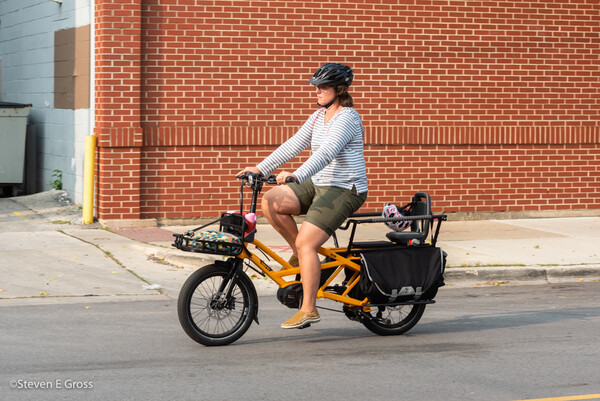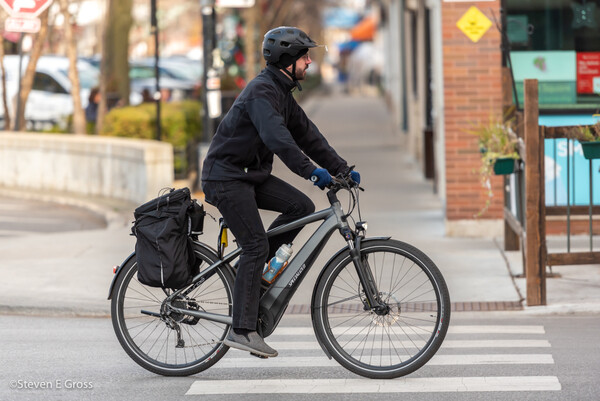Did You Know?
Groundwork begins for an e-bike incentive program

Electric bicycles could have the potential to encourage more people to hop on two wheels as their primary mode of transportation, but their high costs remain a deterrent for many.
That’s why Active Transportation Alliance and Ride Illinois are advocating for an e-bike incentive program in Illinois — the first type of program in the state that would offset the cost of purchasing an e-bike.
Such a program could go a long way in harnessing the rising popularity of e-bikes and reaping the benefits of reducing greenhouse gases and other pollutants, reducing traffic congestion, and offering healthy, affordable mobility.
Given the growing popularity of e-bikes, right now is a good time for exploring an incentive program:
- E-bikes outsold cars 2:1 in the United States in 2021
- Sales of e-bikes tripled from 2019 to 2021
- In 2021, e-bike sales outpaced sales of electric vehicles
REAPING THE BENEFITS
With an electric motor enhancing the ease and efficiency of a traditional bicycle, e-bikes are quickly becoming the popular option for both recreation and transportation.
E-bikes let riders travel farther distances, ride faster, and traverse over more difficult terrain than conventional two wheels. E-bikes also allow older and less-abled people to start or continue biking.
The advantages of e-bikes are summed up on the Ride Illinois website in a quote from Sharon Kaminecki, owner of Earth Rider Cycling, a bike shop in Chicago that sells e-bikes:
“The benefits of e-bikes for transportation are easy to understand because they allow you to reduce your carbon footprint, arrive less exhausted and sweaty, are easy to park, and often allow you to fly around traffic, enabling you to get to your destination faster, and are more cost-effective than an electric car.”

BIG-TICKET ITEM
An incentive program could convince more people to take up e-biking because one of the main barriers to wider adoption is the steep price of an e-bike.
While buying and owning a car is much more expensive than purchasing and maintaining an e-bike, an e-bike costs about $2,600 and an electric cargo bike can sell for about $5,000 — cost prohibitive for many people.
That’s where the Illinois e-bike incentive program comes in. Active Transportation Alliance and Ride Illinois are still working out the details of what they envision for the incentive program, but the cornerstone of such a program usually entails offering vouchers, rebates, and/or tax credits to qualified residents to purchase e-bikes.
FOLLOW THE LEADERS
Several states and cities have implemented e-bike incentive programs. Programs in Denver, Connecticut, Vermont, and one expected to launch in California offer incentives that range from $250 to $1,200, often with a greater amount granted to people with low incomes and people living in environmental justice communities.
The Denver and California programs offer an extra amount for purchasing electric cargo bikes. While most programs offer a rebate, the program in Connecticut offers a tax credit.
Active Transportation Alliance and Ride Illinois are reviewing these programs and other across the United States to configure the best e-bike incentive program for Illinois.
In the meantime, we are working to garner support from community leaders, advocates, government agencies, elected officials and other stakeholders.
The Illinois Environmental Council, Metropolitan Planning Council, Illinois chapter of the American Planning Association, Environmental Law & Policy Center, Equiticity, and Illinois PIRG have already signed on as supporters of the program.
Photos courtesy of Steven Gross.
Make a Donation
Your tax-deductible donation supports the important work that Active Trans does throughout the region
